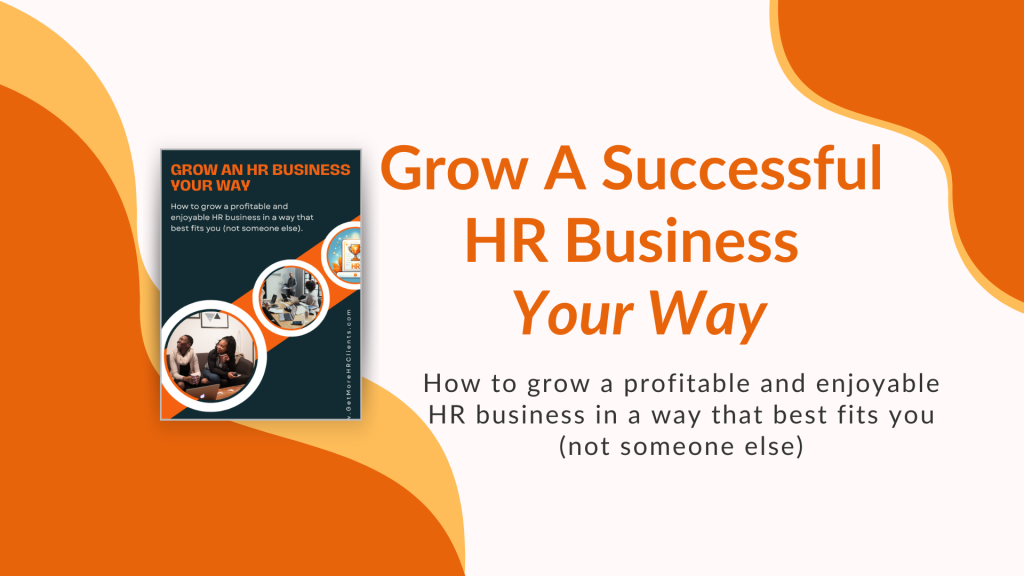I often tell HR consultants and HR Tech companies to make it easier for people to refer them new clients by becoming clear on who their business helps.
I’ve had quite a lot of people tell me that this is really hard to do – especially in an HR sales pitch.
The standard response looks a bit like this:
“Isn’t it enough to say that we help mid-large employers in the [XYZ] industry?“
Well, that’s a start but it’s still quite bland and generic.
Before we start, be sure to join my private HR marketing newsletter for consultants and tech companies in the Human Resources industry.
If you work as a Human Resources consultant or in an HR tech startup in recruitment, training & development, employee engagement, HR consulting, employment law, employee outplacement – my HR marketing update will help.
It reminds me of a time I went to Amsterdam (such a beautiful city) for an RFQ (request for quotation) process.

Back to the issue of generic HR sales pitches . . .
I sat in a meeting room all day with the European CFO and CHRO as we listened to 4 or 5 companies pitch for a major HR service contract.
It was so boring (the meeting, not Amsterdam).
All the companies said the same things, showed the same slides, gave the same sales spiel about their quality and level of expertise.
They all said the same boring things about the quality of their service.
It was years ago so I can’t remember how we chose the winner but I’d say it came down to the lowest price.
Now, let’s talk about you.
What would have happened if you were in that meeting presenting your consulting firm or HR SaaS product?
Would you have said the same things, showed the same slides, given the same sales spiel about your quality and level of expertise?
There are a few options to consider but one great way to get around this identity crisis is to narrow down your focus and serve a particular section of the market.
Narrow down your focus and serve a particular section of the market.
This kind of statement just won’t cut it:
“We offer [service] to small, medium and large companies.”
Become crystal clear on your positioning and be ready to explain it quickly in such a way that people can remember it next time they meet a potential referral.
(You can make it even more powerful by adding who you don’t help).
The more specific you are, the easier it is for people to refer new clients to you.
You want your referrer to be chatting to an ideal client of yours at a conference and say something like:
“Oh, you should definitely talk to [Your Company] Consulting – that’s exactly what they do.
“They go into [Industry you service] companies like yours and help sort out [Problem you solve] by doing [service you offer] and they do it in a way that [benefit of how you deliver the service].
“It’s very cool. Shall I introduce you to them?“
Another benefit to narrowing you focus and choosing a target market is that it is now much easier to:
- Create sections or pages on your website specifically for your target segment.
- Write HR blog articles aimed at your target market.
- Create B2B webinars and videos that address issues for sub-sections of your audience.
- Share social media updates that speak to your target audience.
- Segment your email/CRM database according to the different target audiences and run outbound B2B email campaigns.
- Get client testimonials for each use case to put on your website.
- Write guest articles on other websites.
- Get your first clients when starting a new HR business.
- Run better Google Adwords campaigns aimed at your target market.
- And much more.
Finally, think back to that meeting room in Amsterdam.
Imagine that it’s your turn to pitch.
Unlike all the other contenders which list off a range of unrelated brand names, you’d explain how the company is exactly within your target market.
You’d stand out beautifully.
You’d walk us through all your case studies, blog posts, ebooks, interviews, etc – all of which were specifically tailored to the target market.
But you can only do all that if you’re clear on your target market.
“But Ben, We’re An HR Business With A National/International Market”
Many HR tech firms and large consulting firms find it difficult to segment their overall market.
Unlike consultants who live and work locally, HR tech firms operate on a national or international stage.
This can make things a little tricky.
Don’t worry, I’ve got you covered.
Take a look at this article on how to segment your market.
Download My Handy Positioning Guide
If you’re stuck on how to define your target market or how to describe it, join my private newsletter group and I’ll send you a handy guide to help with this positioning challenge.
Using the quick positioning guide will help you to talk the language of your clients rather than coming up with generic slogans that don’t mean anything to anyone.
If you work as a Human Resources consultant or in an HR tech startup in recruitment, training & development, employee engagement, HR consulting, employment law, employee outplacement – my HR marketing updates will help.

I hope this helps!
If you have any questions, feel free to get in touch.
Ben





